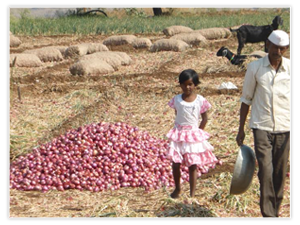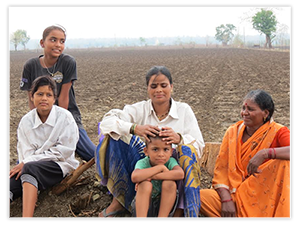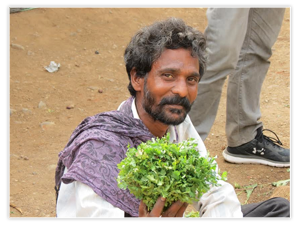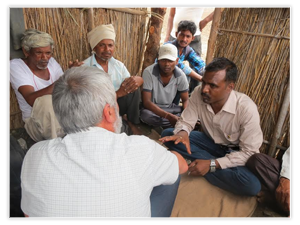We at Jethro believe that providing tools is far more important than supplying immediate needs. Tools can range from changing mode of trade, mastery or professional training, up to a new occupation or way of life.
Our goal is to set a stable base for individuals and the community as a whole so they can thrive on their own. For this reason, our projects include, beside the specific content of the project, training courses for the participants.
In every project where Jethro is involved, social aspects constitute a central element and are a key factor when considering results. Jethro aims to influence communities, our work is directed to strengthen social ties within the community and we do so by working together with the people and believe that joint work of the community is a condition for success.

 |
|
Food4all The problem of hunger and poverty in developing countries is a major issue. Residents of remote villages, which have no direct access to water resources, encounter shortage of fertile soil or lack of professional knowledge and technology, will often find it difficult to avoid hunger and poverty. Food for All gives a "custom made" low cost solution to resolve the hunger problems in a respectful and professional way. Jethro provides not only the means to extricate from poverty, through implementation of processing methods, new crops, new livestock and the adaptation of new technologies, but also professional assistance and "on the job training". We aim to endow the knowledge so that a once wretched village can flourish and become a successful one for years to come. |
 |
|
Smart Village (new agro industrial village) Smart Village project is about people and families. Bringing the commercial sector to the rural agriculture sector, specifically to the farmers in the Smart Village, this project, folds within great social merits, beyond the economical ones. Firstly, the farmer and his family go through professional training that allows them to use and manage state of the art equipment. This training enables the farmer to work with advanced technologies and to pass this knowledge to next generations. Secondly, and maybe even more important, the previously isolated farmer is now a part of a collective of farmers which form a strong community, manufacturing and marketing together for mutual benefit. As the community grows together, health and education improvement will come, and with them, the general welfare increases. |
 |
|
Microfinance People with low income who do not have access to banks or are unable to receive loans from banks or related services are often left in despair without opportunity to prosper or even sustain a reasonable living state. Microfinance, a provision of financial services for low-income clients or solidarity lending groups including consumers and the self-employed, provides them with this opportunity. It is an economic development tool, whose objective is to assist poor people to work their way out of poverty. It covers a wide range of services like credit, savings, insurance, remittance and non-financial services such as training, counseling etc. We at Jethro include microfinancing mechanisms in many suitable projects, because we believe that with opportunity comes hope, and ultimately, prosperity. |
 |
|
Connecting the Dots (a new management approach) Connecting the Dots is about seeing the needs of the individual citizen. Many times people reach a state of crisis following events beyond their control: nature disasters, governmental policies or market behavior. Our solution provides a holistic vision to one's needs and harnesses all possible resources for the joint goal of helping the individual compete with all of the factors he cannot control. The idea is to turn the various governmental/public entities that have or can have an impact on the individual, into a single coordinated and functioning network, bringing them closer and making them more reachable for the individual.Connecting the Dots means creating a link between the professional, financial services and support an individual receives and the social, educational and health services his family enjoys, all linking to his own personal welfare. It is done by helping the individual gain needed subsidies, intensive training programs and by defining clear interactive relations between the system and the individual. |
"With knowledge, training and guidance, community relations turn from restrictors into growth enhancers" Gabi Nahum